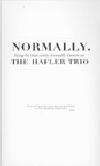THE HAFLER TRIO, "NORMALLY"
Soleilmoon
 The voice of Blixa Bargeld of Einsturzende Neubauten is the rawmaterial from which Andrew McKenzie constructed the sounds on the twodiscs comprising Normally.Disc one begins with silence. Silence is merely sound that lingers justbeyond the threshold of audibility. Silence is unpotentiated space.Sound is the dissipation and usurpation of silence. When sound beginsto gradually seep into the silence of Normally, the experience is akin to the onset of a hallucination. For Normally,McKenzie is not interested in language; any whispers or screamscontributed by Mr. Bargeld are rendered indecipherable, and henceforthaffect the listener on a purely subconscious, subliminal level. This istellingly similar to the practice of talismanic magic, where theconscious desire is sublimated through a series of transformations intoirretrievably esoteric codes and diagrams, bizarre correspondences andperverted anagrams. Magic and ritual are McKenzie's primary motivationson Normally. Like the hallucinatory state, where the mind issometimes freed to make sympathetic connections between thought andmanifestation, so too the sounds on Normally contribute to anunraveled head-state in which synchronicities are the rule rather thanthe exception. At various times during my first listen to disc one, aslayers upon layers of meditational aumgns are gradually compounded, Iheard the unmistakable sounds of descending piano scales, mewlingkittens, distant muffled screams, even the sound of my front doorviolently being forced open. These were phantasms, no doubt, catalyzedby the abstract drones and ghostly monasterial choirs that McKenziesculpts. By the 28-minute mark, the piece has taken on the majesticintensity of Gyorgi Ligeti's haunting choral works, sounding like theinfinite vibratory intonations cascading from the void of space. Disctwo, or "Sphotavado," deals primarily with the breath. Just as AleisterCrowley noted after a lifetime of study devoted to the tantricmeditation, there is no better purgative than pranayama (breathcontrol), and no better way to enervate the aspirant than therepetition of mantra. Using Bargeld's mantric recitations and breathyintonations, McKenzie provides a series of distinct, dynamic passagesover the 65-minutes of the disc. Each passage fades in and out likebreathing, and each takes the listener to a more remote, rarefiedstrata of magical conception. From the gentle, reedy abstractions ofthe opening passage all the way to the serpentine, metallic Kundalinibrain-swipes of the final breath. At high volumes, many of theseprocessed sounds vibrate portions of the ear canal in an unexpectedway. I found that by moving my head back and forth, or changing myposition in the room, I could radically change the experience oflistening to "Sphotavado." McKenzie, therefore, has created a raresound sculpture which can be actively engaged and changed by thelistener. The enigmatic packaging and accompanying foldout bookletcreate a remarkable series of "blinds" that distract and mislead evenas they lay bare the central theme of Normally; words createvibrations; vibration is the result of sound; sound is the articulationof existence; existence is created by a single word, vibrated.
The voice of Blixa Bargeld of Einsturzende Neubauten is the rawmaterial from which Andrew McKenzie constructed the sounds on the twodiscs comprising Normally.Disc one begins with silence. Silence is merely sound that lingers justbeyond the threshold of audibility. Silence is unpotentiated space.Sound is the dissipation and usurpation of silence. When sound beginsto gradually seep into the silence of Normally, the experience is akin to the onset of a hallucination. For Normally,McKenzie is not interested in language; any whispers or screamscontributed by Mr. Bargeld are rendered indecipherable, and henceforthaffect the listener on a purely subconscious, subliminal level. This istellingly similar to the practice of talismanic magic, where theconscious desire is sublimated through a series of transformations intoirretrievably esoteric codes and diagrams, bizarre correspondences andperverted anagrams. Magic and ritual are McKenzie's primary motivationson Normally. Like the hallucinatory state, where the mind issometimes freed to make sympathetic connections between thought andmanifestation, so too the sounds on Normally contribute to anunraveled head-state in which synchronicities are the rule rather thanthe exception. At various times during my first listen to disc one, aslayers upon layers of meditational aumgns are gradually compounded, Iheard the unmistakable sounds of descending piano scales, mewlingkittens, distant muffled screams, even the sound of my front doorviolently being forced open. These were phantasms, no doubt, catalyzedby the abstract drones and ghostly monasterial choirs that McKenziesculpts. By the 28-minute mark, the piece has taken on the majesticintensity of Gyorgi Ligeti's haunting choral works, sounding like theinfinite vibratory intonations cascading from the void of space. Disctwo, or "Sphotavado," deals primarily with the breath. Just as AleisterCrowley noted after a lifetime of study devoted to the tantricmeditation, there is no better purgative than pranayama (breathcontrol), and no better way to enervate the aspirant than therepetition of mantra. Using Bargeld's mantric recitations and breathyintonations, McKenzie provides a series of distinct, dynamic passagesover the 65-minutes of the disc. Each passage fades in and out likebreathing, and each takes the listener to a more remote, rarefiedstrata of magical conception. From the gentle, reedy abstractions ofthe opening passage all the way to the serpentine, metallic Kundalinibrain-swipes of the final breath. At high volumes, many of theseprocessed sounds vibrate portions of the ear canal in an unexpectedway. I found that by moving my head back and forth, or changing myposition in the room, I could radically change the experience oflistening to "Sphotavado." McKenzie, therefore, has created a raresound sculpture which can be actively engaged and changed by thelistener. The enigmatic packaging and accompanying foldout bookletcreate a remarkable series of "blinds" that distract and mislead evenas they lay bare the central theme of Normally; words createvibrations; vibration is the result of sound; sound is the articulationof existence; existence is created by a single word, vibrated.
 The voice of Blixa Bargeld of Einsturzende Neubauten is the rawmaterial from which Andrew McKenzie constructed the sounds on the twodiscs comprising Normally.Disc one begins with silence. Silence is merely sound that lingers justbeyond the threshold of audibility. Silence is unpotentiated space.Sound is the dissipation and usurpation of silence. When sound beginsto gradually seep into the silence of Normally, the experience is akin to the onset of a hallucination. For Normally,McKenzie is not interested in language; any whispers or screamscontributed by Mr. Bargeld are rendered indecipherable, and henceforthaffect the listener on a purely subconscious, subliminal level. This istellingly similar to the practice of talismanic magic, where theconscious desire is sublimated through a series of transformations intoirretrievably esoteric codes and diagrams, bizarre correspondences andperverted anagrams. Magic and ritual are McKenzie's primary motivationson Normally. Like the hallucinatory state, where the mind issometimes freed to make sympathetic connections between thought andmanifestation, so too the sounds on Normally contribute to anunraveled head-state in which synchronicities are the rule rather thanthe exception. At various times during my first listen to disc one, aslayers upon layers of meditational aumgns are gradually compounded, Iheard the unmistakable sounds of descending piano scales, mewlingkittens, distant muffled screams, even the sound of my front doorviolently being forced open. These were phantasms, no doubt, catalyzedby the abstract drones and ghostly monasterial choirs that McKenziesculpts. By the 28-minute mark, the piece has taken on the majesticintensity of Gyorgi Ligeti's haunting choral works, sounding like theinfinite vibratory intonations cascading from the void of space. Disctwo, or "Sphotavado," deals primarily with the breath. Just as AleisterCrowley noted after a lifetime of study devoted to the tantricmeditation, there is no better purgative than pranayama (breathcontrol), and no better way to enervate the aspirant than therepetition of mantra. Using Bargeld's mantric recitations and breathyintonations, McKenzie provides a series of distinct, dynamic passagesover the 65-minutes of the disc. Each passage fades in and out likebreathing, and each takes the listener to a more remote, rarefiedstrata of magical conception. From the gentle, reedy abstractions ofthe opening passage all the way to the serpentine, metallic Kundalinibrain-swipes of the final breath. At high volumes, many of theseprocessed sounds vibrate portions of the ear canal in an unexpectedway. I found that by moving my head back and forth, or changing myposition in the room, I could radically change the experience oflistening to "Sphotavado." McKenzie, therefore, has created a raresound sculpture which can be actively engaged and changed by thelistener. The enigmatic packaging and accompanying foldout bookletcreate a remarkable series of "blinds" that distract and mislead evenas they lay bare the central theme of Normally; words createvibrations; vibration is the result of sound; sound is the articulationof existence; existence is created by a single word, vibrated.
The voice of Blixa Bargeld of Einsturzende Neubauten is the rawmaterial from which Andrew McKenzie constructed the sounds on the twodiscs comprising Normally.Disc one begins with silence. Silence is merely sound that lingers justbeyond the threshold of audibility. Silence is unpotentiated space.Sound is the dissipation and usurpation of silence. When sound beginsto gradually seep into the silence of Normally, the experience is akin to the onset of a hallucination. For Normally,McKenzie is not interested in language; any whispers or screamscontributed by Mr. Bargeld are rendered indecipherable, and henceforthaffect the listener on a purely subconscious, subliminal level. This istellingly similar to the practice of talismanic magic, where theconscious desire is sublimated through a series of transformations intoirretrievably esoteric codes and diagrams, bizarre correspondences andperverted anagrams. Magic and ritual are McKenzie's primary motivationson Normally. Like the hallucinatory state, where the mind issometimes freed to make sympathetic connections between thought andmanifestation, so too the sounds on Normally contribute to anunraveled head-state in which synchronicities are the rule rather thanthe exception. At various times during my first listen to disc one, aslayers upon layers of meditational aumgns are gradually compounded, Iheard the unmistakable sounds of descending piano scales, mewlingkittens, distant muffled screams, even the sound of my front doorviolently being forced open. These were phantasms, no doubt, catalyzedby the abstract drones and ghostly monasterial choirs that McKenziesculpts. By the 28-minute mark, the piece has taken on the majesticintensity of Gyorgi Ligeti's haunting choral works, sounding like theinfinite vibratory intonations cascading from the void of space. Disctwo, or "Sphotavado," deals primarily with the breath. Just as AleisterCrowley noted after a lifetime of study devoted to the tantricmeditation, there is no better purgative than pranayama (breathcontrol), and no better way to enervate the aspirant than therepetition of mantra. Using Bargeld's mantric recitations and breathyintonations, McKenzie provides a series of distinct, dynamic passagesover the 65-minutes of the disc. Each passage fades in and out likebreathing, and each takes the listener to a more remote, rarefiedstrata of magical conception. From the gentle, reedy abstractions ofthe opening passage all the way to the serpentine, metallic Kundalinibrain-swipes of the final breath. At high volumes, many of theseprocessed sounds vibrate portions of the ear canal in an unexpectedway. I found that by moving my head back and forth, or changing myposition in the room, I could radically change the experience oflistening to "Sphotavado." McKenzie, therefore, has created a raresound sculpture which can be actively engaged and changed by thelistener. The enigmatic packaging and accompanying foldout bookletcreate a remarkable series of "blinds" that distract and mislead evenas they lay bare the central theme of Normally; words createvibrations; vibration is the result of sound; sound is the articulationof existence; existence is created by a single word, vibrated.



